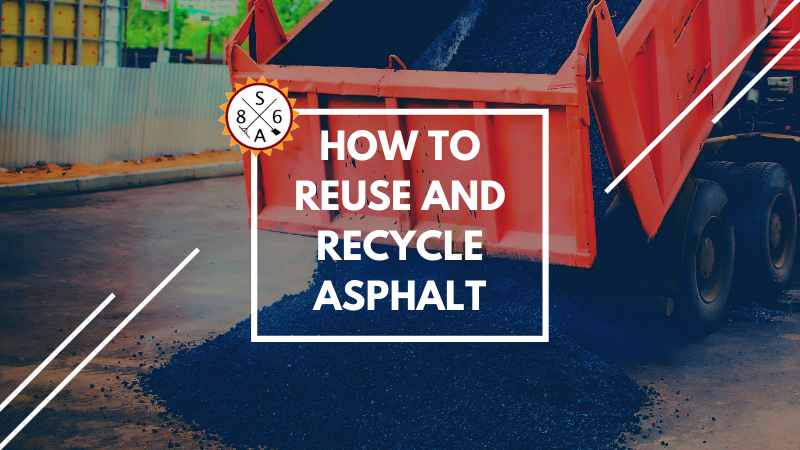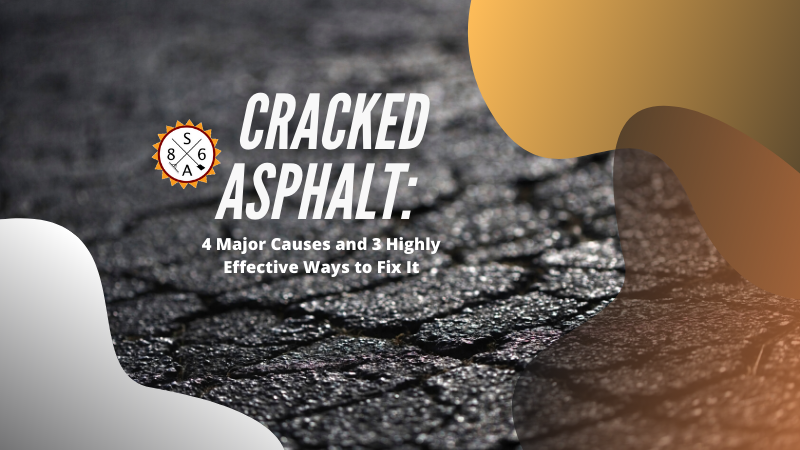
Tips to Avoid Pricey Asphalt Repairs
An asphalt driveway, parking lot or other parcel can be extremely durable and continue to look good for a long time. However, to keep your asphalt in good condition, it is important that you keep it properly maintained. There are five tips in particular that could be followed to help protect your asphalt, extend its useful life and prevent more costly repairs in the future.
Remove all Debris
One of the most important asphalt care tips to follow to keep your asphalt in good working order is to remove all debris that you come across. Tree branches and other debris are going to be blown onto your asphalt from time to time. When these items are not removed, they can block the flow of water and create standing pools. This could start to cause deterioration and damage to your asphalt. Due to this, it is very important that you have this debris removed as soon as it is noticed. This can be even more important during the winter months when ice and snow could form around the debris.
Repair and Seal All Cracks and Holes
For asphalt maintenance, it is also very important that you have the asphalt repaired as soon as you can. If you notice that there are small holes and cracks in your asphalt, you should call a professional for asphalt repair to ensure these are filled in as soon as you can. When you have these holes repaired, it will help to prevent ice, salt, water and other debris from getting in, which could cause further damage in the future.
Shovel Regularly
If your business is located in a cold climate, the impact of bad winter weather on asphalt can be noticeable. Once the snow and ice melts, many people will identify a range of holes and cracks in their asphalt. However, this can be managed better if you shovel regularly. When you are able to shovel on a regular basis, it will help to clear all of the snow and ice and will prevent cracking.
Be Careful of De-Icing Products
While it is important to get rid of snow and ice, you should be careful about the products that you use. Most of the major de-icing products that you will find will contain rock salt. While this can help to break down and prevent ice, it can also cause serious damage to your asphalt. For proper asphalt care, you should look for a product that uses potassium chloride as it will be effective without harming your asphalt.
Don’t Ignore Pooling Water
If you notice that there is standing water on your asphalt, you should have the issue fixed as soon as you can. Pooling water can be due to poor drainage or deterioration of the asphalt. If you do not call a professional for asphalt repair to fix this issue quickly, it will continue to become more problematic as it will cause further deterioration and pot holes.
Ultimately, with proper asphalt maintenance and care, you could expect that your asphalt will last for a long time. To ensure that you are caring for your asphalt, you should follow these five tips. These will help to ensure that you remain diligent about caring for your asphalt, which will keep it in great shape for years to come.
An asphalt driveway, parking lot or other parcel can be extremely durable and continue to look good for a long time. However, to keep your asphalt in good condition, it is important that you keep it properly maintained. There are five tips in particular that could be followed to help protect your asphalt, extend its useful life and prevent more costly repairs in the future.
Remove all Debris
One of the most important asphalt care tips to follow to keep your asphalt in good working order is to remove all debris that you come across. Tree branches and other debris are going to be blown onto your asphalt from time to time. When these items are not removed, they can block the flow of water and create standing pools. This could start to cause deterioration and damage to your asphalt. Due to this, it is very important that you have this debris removed as soon as it is noticed. This can be even more important during the winter months when ice and snow could form around the debris.
Repair and Seal All Cracks and Holes
For asphalt maintenance, it is also very important that you have the asphalt repaired as soon as you can. If you notice that there are small holes and cracks in your asphalt, you should call a professional for asphalt repair to ensure these are filled in as soon as you can. When you have these holes repaired, it will help to prevent ice, salt, water and other debris from getting in, which could cause further damage in the future.
Shovel Regularly
If your business is located in a cold climate, the impact of bad winter weather on asphalt can be noticeable. Once the snow and ice melts, many people will identify a range of holes and cracks in their asphalt. However, this can be managed better if you shovel regularly. When you are able to shovel on a regular basis, it will help to clear all of the snow and ice and will prevent cracking.
Be Careful of De-Icing Products
While it is important to get rid of snow and ice, you should be careful about the products that you use. Most of the major de-icing products that you will find will contain rock salt. While this can help to break down and prevent ice, it can also cause serious damage to your asphalt. For proper asphalt care, you should look for a product that uses potassium chloride as it will be effective without harming your asphalt.
Don’t Ignore Pooling Water
If you notice that there is standing water on your asphalt, you should have the issue fixed as soon as you can. Pooling water can be due to poor drainage or deterioration of the asphalt. If you do not call a professional for asphalt repair to fix this issue quickly, it will continue to become more problematic as it will cause further deterioration and pot holes.
Ultimately, with proper asphalt maintenance and care, you could expect that your asphalt will last for a long time. To ensure that you are caring for your asphalt, you should follow these five tips. These will help to ensure that you remain diligent about caring for your asphalt, which will keep it in great shape for years to come.




